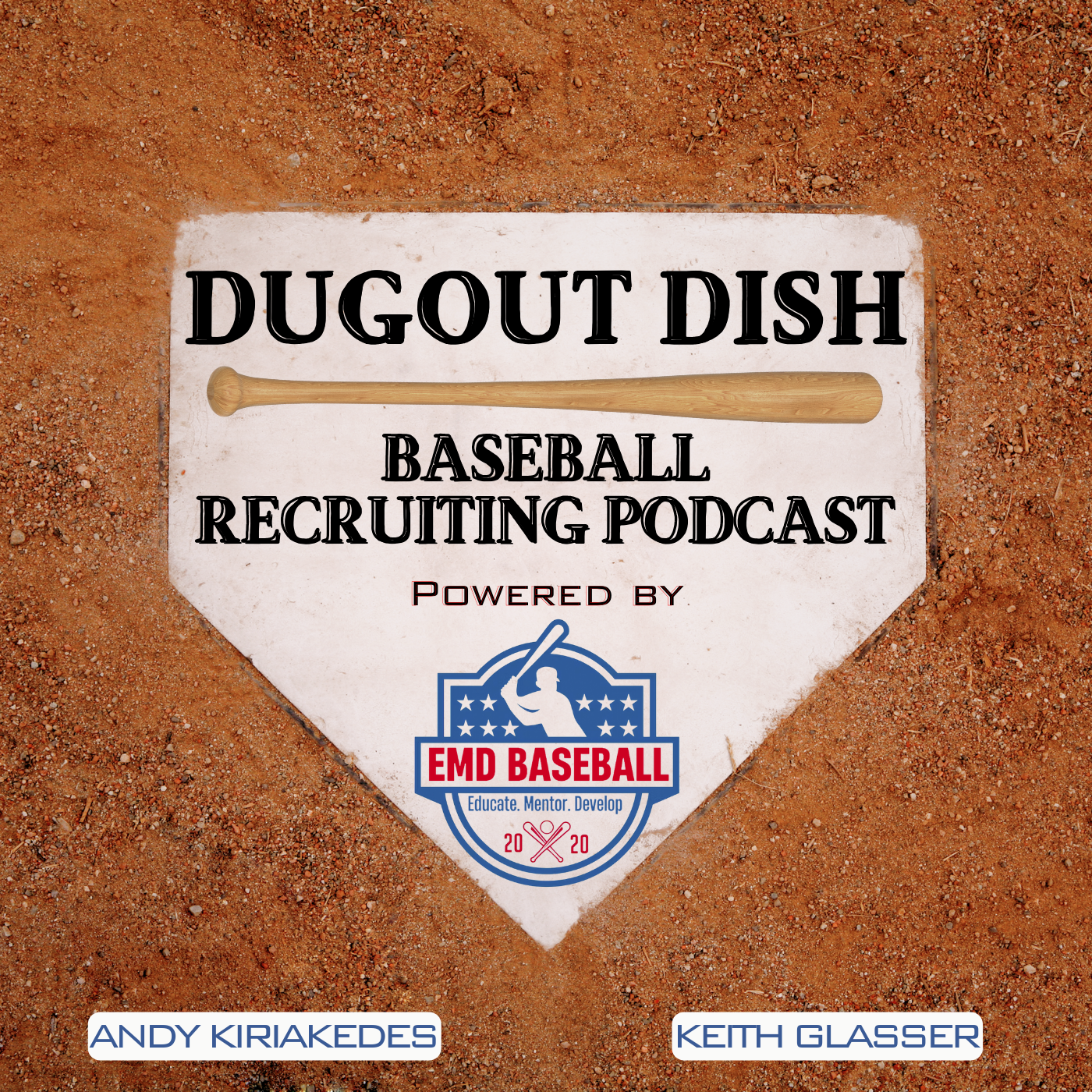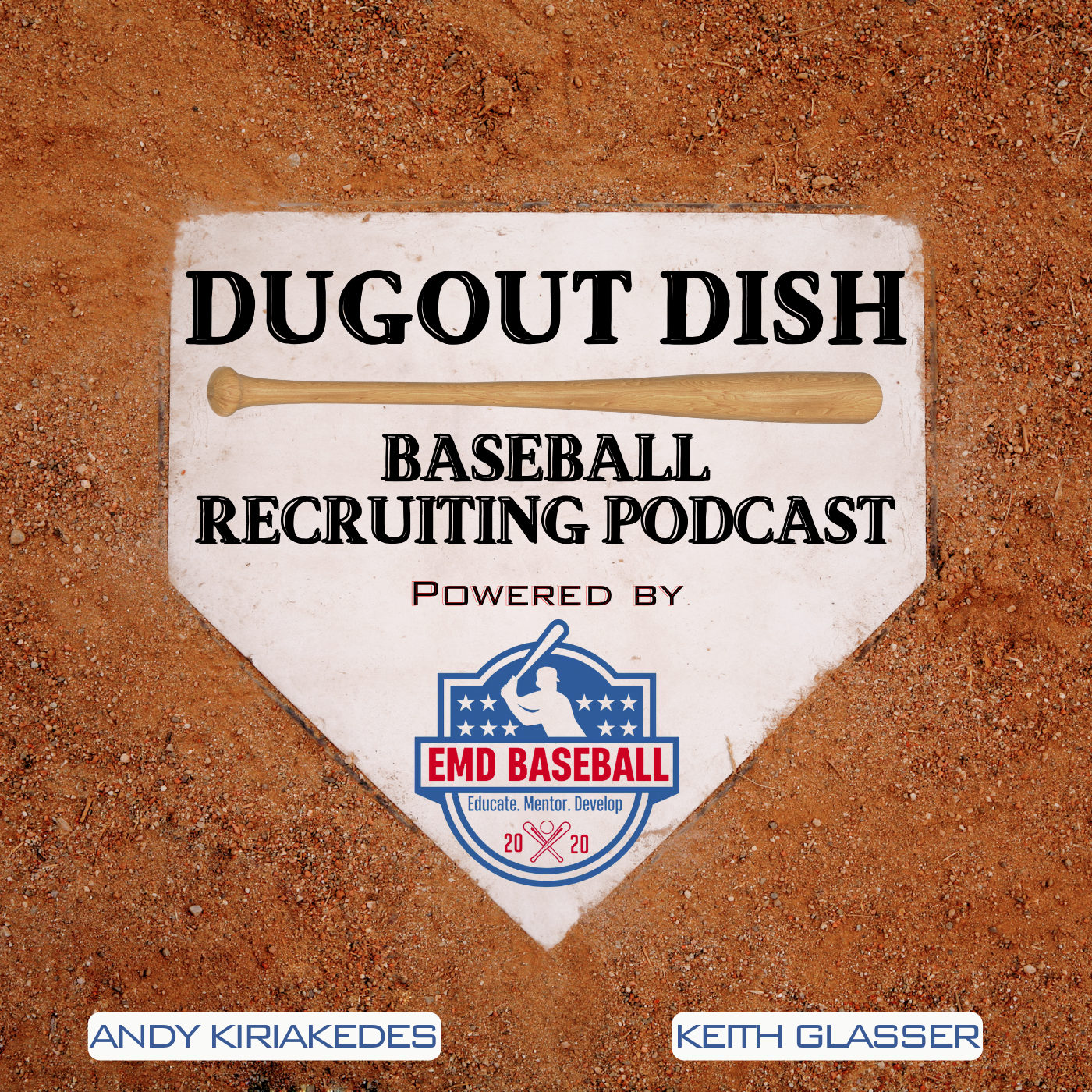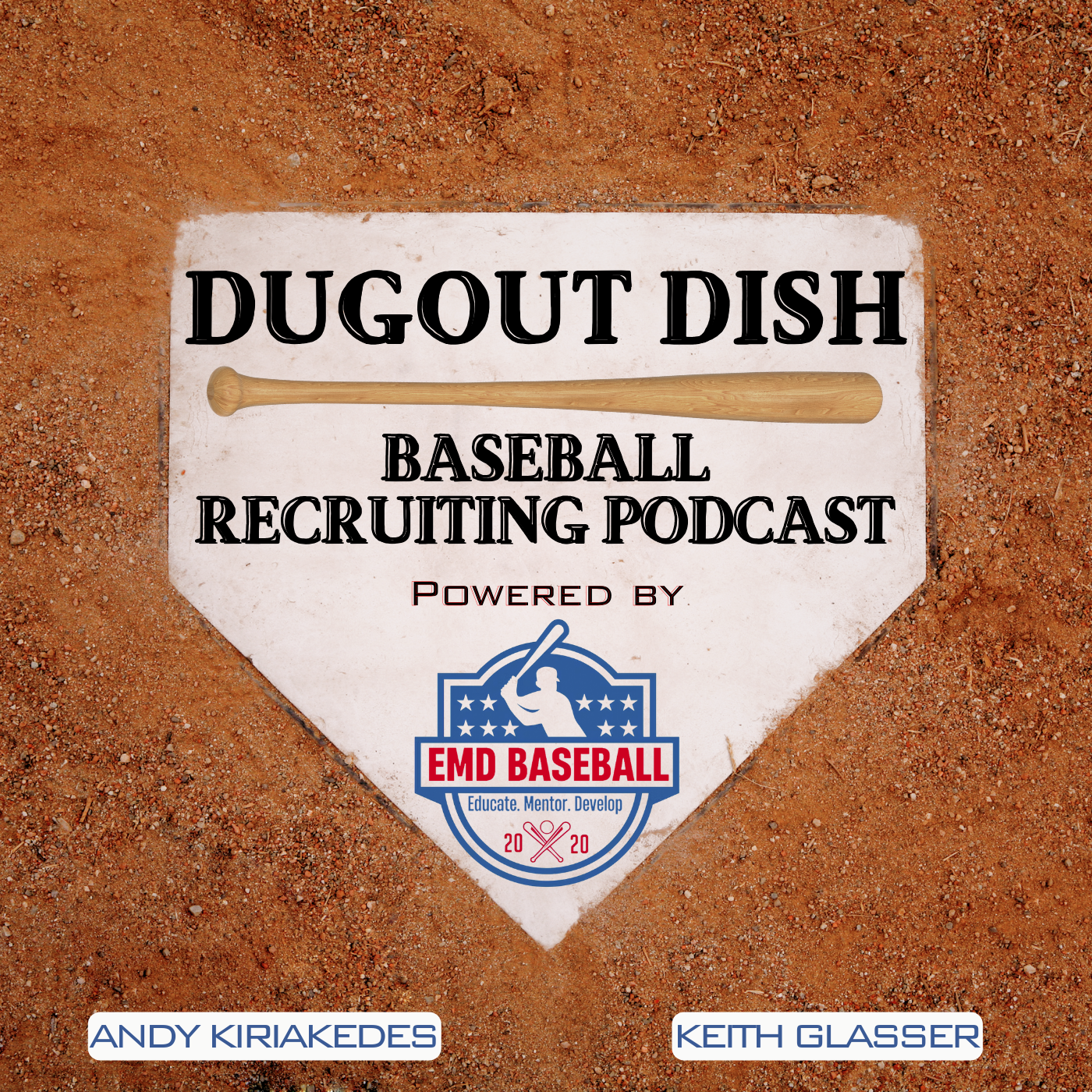Episode Transcript
[00:00:00] Speaker A: Foreign.
[00:00:11] Speaker B: Hello, everybody. Welcome to this week's edition of in the Clubhouse with emd. I'm Andy Kirakiti, joined by my wonderful co host, Keith Blasser. Keith, how we doing?
[00:00:21] Speaker A: Great. How are you?
[00:00:22] Speaker B: I'm good.
Today's topic, and I think this is an important one, specifically around preparation and how to showcase yourself really well from a pitching perspective, is proper timing or spacing of outings to make sure that you are doing yourself, that you're putting yourself in a situation to showcase the best of your ability.
We see this pop up every summer where guys are trying to get recruited, things get condensed. They're throwing in tournaments, they're trying to go to camps, they're trying to go to showcases.
And oftentimes what can happen is that if spacing of these events isn't taken into consideration, that you can see significant velo fluctuations and you can see significant drops in performance when, to be quite honest with you, if you're 20, 25 right now and you're trying to get recruited, you don't have a ton of room for error. And you want to make sure that every time you take the mound, you're giving yourself every chance possible to showcase the best version of yourself. So I know you got some thoughts on this, so let's talk about it.
[00:01:37] Speaker A: Yeah, I think you gave me a great lead in there. I think one of the biggest things that. And we both saw this when we were coaching and we see it on this side now is, you know, you see guys that are, you know, one week you see them, they're 82, 84, and then the next week they're 86, 88, or, you know, you get told that they're going to be, you know, 80, 82, and then you show up and they're 75, 76.
And like, we understand that this stuff happens, right? Like, as coaches, we get it, you know, And I think on the other side of it now, because on the coaching end of it and on the recruiting end of it, I can only go off of what I saw with my eyes, right? Like, everyone in the world can tell me that you were 87 to 88, and the two times I showed up to watch you throw, you were 81 to 83. Like, I never saw you get to those numbers. I'm not recruiting you.
And look, that could turn around and bite me if you end up somewhere because someone else saw you and you end up in our league and beat me. But you can only go off of what you see and what your. Your radar gun and Everything is telling you. The other side of that is now that we're on the flip side of the coaching end of it is that there are, you know, if you're throwing in a showcase on a Saturday and you throw 60 pitches and then you turn around and go to another showcase on Tuesday or Wednesday and throw another 60 pitches, like, the likelihood of you being sharp and dialed in on that following Tuesday is pretty slim. You went through 60 pitches. You likely didn't do anything that you needed to be doing in between on those two other days, and then you went through another 60 pitches on Tuesday. Like, you know, in college, we build guys up to that and, you know, I think it gets lost during the recruiting cycle on players and families of, like, we're just going to sign up to everything and go.
And then you end up, like, you end up overworking yourself, especially from a pitching standpoint of like, throwing far too much, far too soon, not giving yourself enough time in between to get into a good cadence of, like, okay, I'm going to throw every five days, and this is what it looks like. And in between starts, I'm going to do this. I'm throwing a flat ground on day three. Day four is a slow load day, low load day, excuse me. And then day five is, you know, when I'm going to get into it, and it's a full go.
And I think that, like, you know, we get into this cadence of, you know, sometimes like, well, I want to sign up to this camp and I want to go to this showcase, and then I'm going to be in this tournament with my team. And then, you know, and it's just. You think that just throwing, you know, two, three innings here and there isn't really that big of a deal from a workload standpoint until you're throwing 60 pitches every two or three days with no, you know, with no deload or nothing going on in between, when likely in.
In most of these instances, these kids are usually going and playing center field or right field or shortstop or third base or catch.
And like, you were like, there's no.
There's no time off to rest and recover from that standpoint. So then, you know, we wonder why we have a velo dip or maybe the. For, you know, whatever, you know, one of your three innings wasn't great or one of your two innings wasn't great, whatever it is. And, you know, we grasp at straws to kind of figure out why. And it's like, well, I can tell you why. Like, you threw 75 pitches two days ago and then you went and tried to throw another 40 today. Like you're, you're tired, you're just like, you can't recover fast enough to be able to do that, you know. So I think that like being able to kind of plan out what it is that you want to do, and we've had this conversation before do when it comes to, you know, and this is, this can get into a broader thing, but like, you know, if you're, if you're going down to Georgia and there's no schools down there that you want that are going to be there, that are recruiting you like, and there's a camp up here, like you should prep for that camp. I know that's a tough conversation to have and summer coaches would eat us alive for this. But like you're going to take a kid down there to get recruited by a bunch of schools that like, he has no interest in when he has the opportunity to go do this, you know. And I think that those, those types of things work into this conversation too, because people don't want to upset, they don't want to rock the boat there. So they're going to go throw their two or three innings, then turn around and throw another two or three innings the next day at a different camp and then take two days off and go through two or three innings and all of a sudden like those two, three innings really start to add up on, on arms, on wear and tear, on recovery, on everything. And then it gets to the end and it's like, well, you know, I'm 81 to 82 and no one wants to recruit me when at the start of the Summer I was 85 to 87, thinking I was going to get better and throw harder. But you know, when you look, you take that 30,000 foot view, it's like, yo, you're throwing every two days with no, no rest or recovery in between and hoping that this is going to work well, work out for you, and it's just not going to.
[00:06:28] Speaker B: Nope. And you got to be able to put your best foot forward and it doesn't really matter what the scenario is in spacing, timing. Rest, like being on proper rest is really important for young pitchers. It's important for big leaguers. There's a reason that starters throw on a cadence is because it gives them a chance. It's not about start day, it's about having the proper spacing for proper rest, proper preparation and proper recovery.
It's no different for a 15 or 16 or 17 year old arm who's going through this process. And you have to be cognitive of the spacing in between your outings. And if you are going to have tighter windows between throwing, you need to pay attention to volume, right? If you're going to throw on Saturday and then you're going to throw again on Wednesday and Wednesday is the more important day. Like Saturday needs to be a shorter session so that you have Sunday, Monday, Tuesday, three full days of rest and you're not Recovering from a 90 pitch start, you're recovering from a 30 or 45 pitch outing where you're able to get in front of some schools and take advantage of that moment and still come back on Wednesday and be effective.
This, I could take this a long, long way. But this gets into a pet peeve of mine when it comes to some of the tournaments and how they're set up. And I think it's a major issue. I think it's something that perfect game needs to address is the volume of games that these kids play in. Most of the rosters for these travel ball teams are not deep enough to where you can get through an eight game schedule in five days and not require kids to throw on short rest. And just because you tell a kid, hey, you're only throwing three innings on Saturday because you're going to come back on Tuesday, like if that kid throws 45 pitches, there's very few high schoolers who have trained to recover like a bullpen arm. And from a coach's perspective, like I'll say it how it is, like you're putting that kid in a bad spot, period.
All because you're trying to win some trophy that doesn't matter at all.
So if you're a player, you're a parent, you need to communicate with your coaches on what your schedule is so they can make sure that you're getting the proper rest and that you're throwing in the proper locations. Like I don't know, the travel ball, who's worth their salt, that if you come to them and say, hey coach, I know we got games Friday, Saturday and Sunday, but I'm going to a camp on Wednesday and it's a camp that I really want to be able to throw all that. Is there any way that I can throw in the Friday game so I get enough rest so I can be successful in that game?
Any travel ball coach that you are that you should want to play for is going to say, yeah, no problem, we'll get you in that Friday game or we'll make it work or we'll do a short outing on Saturday so you can get in front of some coaches and you can get three days of full rest before you go into that Wednesday outing. They'll do something. If they don't, you need to go find another travel team because they don't care about you.
But from a pitching perspective, Velo is not the only thing. But it's a barrier to entry at any level, and you need to be able to flash the numbers that you're capable of. And rest is a very important ingredient in the recipe for getting recruited. And you have to take it into consideration as you put together your summer schedule.
Yeah.
[00:09:44] Speaker A: And the, the, the, the other side of it, and this is where I get, you know, this side of it, we have to mitigate it with, like, we're not making excuses for why we weren't necessarily this good. We, we have to have a better idea of where we're throwing from a spacing standpoint. But the other part of it is, like, from a coaching standpoint, and we've all done this and there's someone waiting in the wings here who's shaking his head in two seconds. Like when kids email us after the fact and they're, they, they were not as good as they wanted to be. Like, we get that email of like, well, you know, I was tired and I threw here and I did this and I didn't do this. And it's like, if you're already making excuses in the recruiting process for why you weren't good enough, like, what's going to happen when you show up here? Like, you're not, you're not going to actually want to work to get better. You're just going to do whatever it is that you want to do and make excuses for why you weren't good. And those become red flags in the recruiting process, and we want to avoid that at all cost. And I think that a lot of it comes back to just understanding where you should be from, like, how you need to prep in order to get prepared for your. What is the most important kind of camp or showcase or clinic, whatever it is you're going to or tournament, it could be that too. So, like, prioritizing those and making sure that you are being able to get the correct amount of rest and recovery so that you can put your best foot forward when coaches are actually showing up to watch you throw, you know, and I, I just, I have a hard time when, you know, especially when you're going to specific camps of schools that you want to go to. And you know, you threw three days ago. You are, you're on two days rest. You threw like 75 pitches. And then you want to be really good in two days. Like, it's just like you're. It's not to say you're not good enough, but you haven't been built up to do it and you're not good enough to do it yet at 16 or 17 years old, you know, so, like, it's prioritizing what it is that you want out of it, but also understanding that you can't just throw two innings every two days and think that it's going to go well.
[00:11:35] Speaker B: Yeah. And then the last thing I'll say is, like, you're introducing yourself to injury risk because you don't have the proper recovery. Right. And I know there's a lot of data that suggests that one of the big issues with some of the arm injuries that seemingly keep increasing is that recovery is, is certainly. It's definitely a piece of the puzzle.
And health, like, if you can't throw because you're hurt, you can't get seen.
So that's another piece of it. If you want to take into account another variable in this equation is that health is paramount and you can't showcase yourself if you're not ready to throw. So take that with.
[00:12:17] Speaker A: The ability is availability.
[00:12:19] Speaker B: Best ability is availability, for sure. And you know, it's important. So for, you know, the families out there listening, whether you're 25, 26, 27, you know, think about how you plan your outings and make sure that you can put your best foot forward. And two, that you're putting yourself in a situation where you can stay healthy and you can stay on a plan and you can stay in your throwing program.
That's all going to be beneficial for you, not only in the short term with your performance in front of coaches, but in the long term when it comes to your development and your health.
Anything else?
[00:12:53] Speaker A: Nope. Nailed it.
[00:12:54] Speaker B: All right, well, thank you for listening, everybody. Check in next week. We'll talk to you then. Thank you.
Thank you for listening this week. If you're watching on YouTube, go ahead and hit that subscribe button and smash that like button for us. Check us out on Apple Podcasts, Google Podcasts, as well as Spotify. You can follow us on Twitter and Instagram MD Baseball. If you want to find out what me and Keith do to help families and players navigate the recruiting process, go ahead and check us out on emdbaseball.com take a few minutes to check out our new online academy. I promise you'll get some good information out of that. Thanks again for listening. Check in with you next week.


